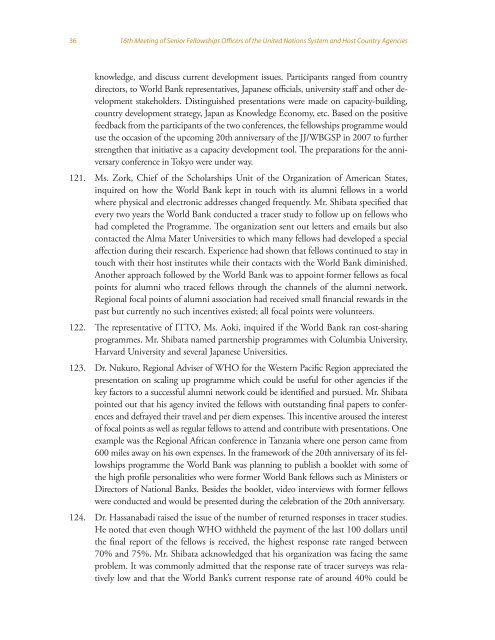16th Meeting of Senior Fellowships Officers of the ... - Development
16th Meeting of Senior Fellowships Officers of the ... - Development
16th Meeting of Senior Fellowships Officers of the ... - Development
You also want an ePaper? Increase the reach of your titles
YUMPU automatically turns print PDFs into web optimized ePapers that Google loves.
36<br />
<strong>16th</strong> <strong>Meeting</strong> <strong>of</strong> <strong>Senior</strong> <strong>Fellowships</strong> <strong>Officers</strong> <strong>of</strong> <strong>the</strong> United Nations System and Host Country Agencies<br />
knowledge, and discuss current development issues. Participants ranged from country<br />
directors, to World Bank representatives, Japanese <strong>of</strong>ficials, university staff and o<strong>the</strong>r development<br />
stakeholders. Distinguished presentations were made on capacity-building,<br />
country development strategy, Japan as Knowledge Economy, etc. Based on <strong>the</strong> positive<br />
feedback from <strong>the</strong> participants <strong>of</strong> <strong>the</strong> two conferences, <strong>the</strong> fellowships programme would<br />
use <strong>the</strong> occasion <strong>of</strong> <strong>the</strong> upcoming 20th anniversary <strong>of</strong> <strong>the</strong> JJ/WBGSP in 2007 to fur<strong>the</strong>r<br />
streng<strong>the</strong>n that initiative as a capacity development tool. The preparations for <strong>the</strong> anniversary<br />
conference in Tokyo were under way.<br />
121. Ms. Zork, Chief <strong>of</strong> <strong>the</strong> Scholarships Unit <strong>of</strong> <strong>the</strong> Organization <strong>of</strong> American States,<br />
inquired on how <strong>the</strong> World Bank kept in touch with its alumni fellows in a world<br />
where physical and electronic addresses changed frequently. Mr. Shibata specified that<br />
every two years <strong>the</strong> World Bank conducted a tracer study to follow up on fellows who<br />
had completed <strong>the</strong> Programme. The organization sent out letters and emails but also<br />
contacted <strong>the</strong> Alma Mater Universities to which many fellows had developed a special<br />
affection during <strong>the</strong>ir research. Experience had shown that fellows continued to stay in<br />
touch with <strong>the</strong>ir host institutes while <strong>the</strong>ir contacts with <strong>the</strong> World Bank diminished.<br />
Ano<strong>the</strong>r approach followed by <strong>the</strong> World Bank was to appoint former fellows as focal<br />
points for alumni who traced fellows through <strong>the</strong> channels <strong>of</strong> <strong>the</strong> alumni network.<br />
Regional focal points <strong>of</strong> alumni association had received small financial rewards in <strong>the</strong><br />
past but currently no such incentives existed; all focal points were volunteers.<br />
122. The representative <strong>of</strong> ITTO, Ms. Aoki, inquired if <strong>the</strong> World Bank ran cost-sharing<br />
programmes. Mr. Shibata named partnership programmes with Columbia University,<br />
Harvard University and several Japanese Universities.<br />
123. Dr. Nukuro, Regional Adviser <strong>of</strong> WHO for <strong>the</strong> Western Pacific Region appreciated <strong>the</strong><br />
presentation on scaling up programme which could be useful for o<strong>the</strong>r agencies if <strong>the</strong><br />
key factors to a successful alumni network could be identified and pursued. Mr. Shibata<br />
pointed out that his agency invited <strong>the</strong> fellows with outstanding final papers to conferences<br />
and defrayed <strong>the</strong>ir travel and per diem expenses. This incentive aroused <strong>the</strong> interest<br />
<strong>of</strong> focal points as well as regular fellows to attend and contribute with presentations. One<br />
example was <strong>the</strong> Regional African conference in Tanzania where one person came from<br />
600 miles away on his own expenses. In <strong>the</strong> framework <strong>of</strong> <strong>the</strong> 20th anniversary <strong>of</strong> its fellowships<br />
programme <strong>the</strong> World Bank was planning to publish a booklet with some <strong>of</strong><br />
<strong>the</strong> high pr<strong>of</strong>ile personalities who were former World Bank fellows such as Ministers or<br />
Directors <strong>of</strong> National Banks. Besides <strong>the</strong> booklet, video interviews with former fellows<br />
were conducted and would be presented during <strong>the</strong> celebration <strong>of</strong> <strong>the</strong> 20th anniversary.<br />
124. Dr. Hassanabadi raised <strong>the</strong> issue <strong>of</strong> <strong>the</strong> number <strong>of</strong> returned responses in tracer studies.<br />
He noted that even though WHO withheld <strong>the</strong> payment <strong>of</strong> <strong>the</strong> last 100 dollars until<br />
<strong>the</strong> final report <strong>of</strong> <strong>the</strong> fellows is received, <strong>the</strong> highest response rate ranged between<br />
70% and 75%. Mr. Shibata acknowledged that his organization was facing <strong>the</strong> same<br />
problem. It was commonly admitted that <strong>the</strong> response rate <strong>of</strong> tracer surveys was relatively<br />
low and that <strong>the</strong> World Bank’s current response rate <strong>of</strong> around 40% could be

















